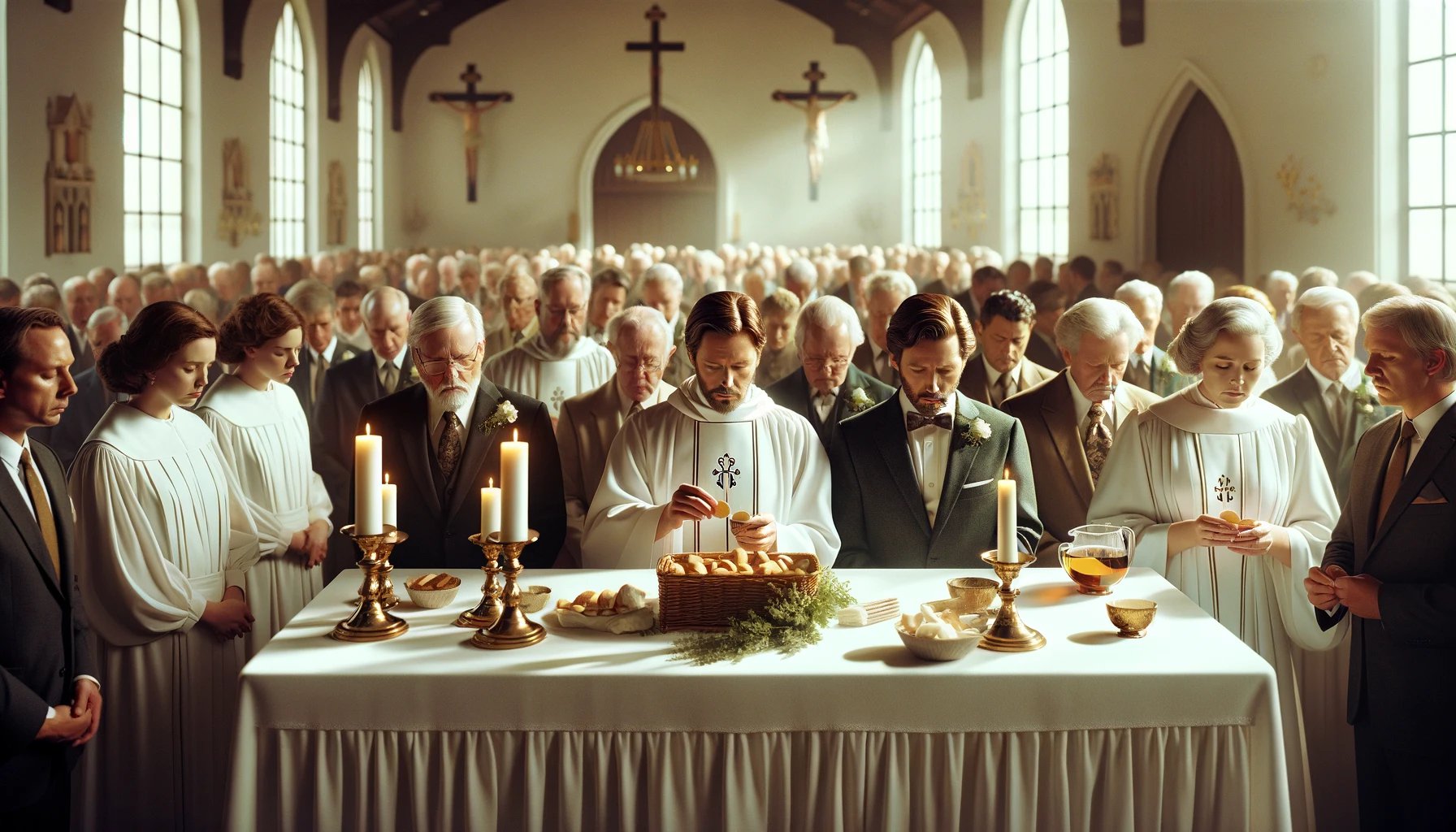Home>Theology and Spirituality>Why Is Communion On The First Sunday Of The Month


Theology and Spirituality
Why Is Communion On The First Sunday Of The Month
Published: February 19, 2024
Ericka Andersen, an editor at Christian.net, expertly merges digital strategy with content creation, focusing on faith and societal issues. Her communication skills enhance the platform's engaging narratives, fostering meaningful dialogue on belief's impact on society.
Discover the significance of Communion on the first Sunday of the month and its theological and spiritual implications. Explore the rich tradition and meaning behind this practice.
(Many of the links in this article redirect to a specific reviewed product. Your purchase of these products through affiliate links helps to generate commission for Christian.net, at no extra cost. Learn more)
Table of Contents
Introduction
Communion, also known as the Lord's Supper or the Eucharist, holds a central place in Christian worship and theology. It is a sacred ritual that symbolizes the body and blood of Jesus Christ, and it is observed with reverence and solemnity by various Christian denominations. The practice of communion has been an integral part of Christian tradition for centuries, carrying deep spiritual and theological significance.
The observance of communion varies among different Christian traditions, with some celebrating it weekly, while others do so monthly or on special occasions. The frequency and timing of communion services are often influenced by theological, historical, and practical considerations within each denomination.
In this article, we will explore the historical background of communion, its significance in Christianity, and the tradition of monthly communion. We will delve into the reasons behind the practice of observing communion on the first Sunday of the month, examining both the biblical basis and practical considerations that underpin this tradition. By gaining a deeper understanding of the significance and timing of communion, we can appreciate its profound spiritual impact and the rich tapestry of Christian worship and tradition.
Read more: Why Take Communion Every Sunday
Historical Background of Communion
The historical roots of communion can be traced back to the Last Supper, a significant event in the life of Jesus Christ. According to the New Testament accounts in the Gospels of Matthew, Mark, and Luke, the Last Supper took place during the Jewish festival of Passover, as Jesus shared a final meal with his disciples before his crucifixion. During this meal, Jesus instituted the practice of communion by sharing bread and wine with his disciples, instructing them to partake in remembrance of him.
The early Christian community, deeply influenced by the teachings and actions of Jesus, incorporated the practice of communion into their worship gatherings. The Apostle Paul, in his first letter to the Corinthians, provided one of the earliest written accounts of the Lord's Supper, emphasizing its significance as a commemoration of Jesus' sacrificial death and a symbol of the new covenant in his blood.
As Christianity spread and evolved, the observance of communion became a central element of Christian worship, reflecting the foundational beliefs of the faith. The early church fathers, such as Ignatius of Antioch and Justin Martyr, wrote about the celebration of the Eucharist, highlighting its spiritual and communal importance within the Christian community.
Throughout history, various theological perspectives and liturgical practices surrounding communion emerged within different branches of Christianity. The concept of transubstantiation, consubstantiation, and symbolic memorialism became subjects of theological debate, shaping the understanding of how the bread and wine are related to the body and blood of Christ during the communion service.
The Protestant Reformation in the 16th century brought further diversity in the understanding and practice of communion, with reformers such as Martin Luther, John Calvin, and Ulrich Zwingli offering distinct theological interpretations of the Lord's Supper. These theological differences contributed to the development of various communion traditions and liturgical expressions within Protestantism, Catholicism, and Orthodox Christianity.
The historical background of communion reflects its enduring significance as a sacred rite that connects Christians to the foundational events of Jesus' life and ministry. This rich historical tapestry provides a deeper appreciation for the spiritual and theological dimensions of communion within the broader context of Christian tradition and worship.
Significance of Communion in Christianity
The significance of communion in Christianity extends far beyond a mere ritual or symbolic gesture. It holds profound spiritual, theological, and communal significance that resonates deeply within the Christian faith. At its core, communion serves as a tangible expression of the central beliefs and values of Christianity, embodying themes of redemption, unity, and remembrance.
First and foremost, communion symbolizes the sacrificial death of Jesus Christ and the redemptive act of atonement. The sharing of bread, representing the body of Christ, and wine, symbolizing his blood, serves as a poignant reminder of Jesus' ultimate sacrifice on the cross. This act of remembrance not only commemorates the historical event of Jesus' crucifixion but also reaffirms the foundational Christian belief in the transformative power of Christ's sacrifice for the forgiveness of sins.
Furthermore, communion fosters a sense of spiritual unity and communal fellowship among believers. As Christians partake in the elements together, they are reminded of their shared identity as members of the body of Christ. The act of coming together to participate in communion underscores the interconnectedness of the Christian community, transcending individual experiences to emphasize the collective bond and mutual support found in the body of believers.
In addition, communion serves as a means of spiritual nourishment and sustenance for the Christian journey. The act of partaking in the bread and wine signifies a spiritual feeding, wherein believers are reminded of their dependence on Christ for sustenance and strength. This spiritual nourishment empowers Christians to persevere in their faith and live out their calling as followers of Christ, drawing strength from the symbolic elements that represent the sustaining grace and presence of Jesus in their lives.
Moreover, communion embodies the concept of remembrance, inviting believers to reflect on the life, teachings, and sacrificial love of Jesus Christ. Through the act of partaking in communion, Christians engage in a reflective practice that deepens their connection to the life and ministry of Jesus, reinforcing the significance of his teachings and example in shaping their faith and conduct.
In essence, the significance of communion in Christianity encompasses themes of redemption, unity, spiritual nourishment, and remembrance, weaving together a tapestry of profound meaning that enriches the spiritual journey of believers. This sacred practice continues to hold a central place in Christian worship, serving as a poignant expression of the core tenets and values that define the Christian faith.
The Tradition of Monthly Communion
The tradition of monthly communion, observed by many Christian congregations, holds a significant place within the tapestry of Christian worship and spiritual practice. This practice entails the regular observance of the Lord's Supper on a monthly basis, often scheduled on the first Sunday of each month. The tradition of monthly communion reflects a deliberate and structured approach to commemorating the sacrificial act of Jesus Christ and engaging in communal remembrance and spiritual nourishment.
Monthly communion serves as a rhythm of spiritual renewal and communal unity within the life of the church. By designating a specific Sunday each month for the observance of communion, congregations establish a regular cadence for engaging in this sacred ritual. This rhythm creates a sense of anticipation and preparation among the church community, fostering an atmosphere of reverence and spiritual attentiveness as believers gather to partake in the elements of bread and wine.
Furthermore, the tradition of monthly communion provides a consistent opportunity for believers to reflect on the significance of Christ's sacrifice and the redemptive message of the gospel. The regular observance of communion reinforces the foundational beliefs of the Christian faith, offering a recurring moment for believers to recenter their hearts and minds on the core tenets of their spiritual journey. This intentional rhythm of remembrance and reflection deepens the spiritual impact of communion, allowing individuals to continually draw strength and inspiration from the profound symbolism of the Lord's Supper.
Additionally, the practice of monthly communion fosters a sense of communal unity and shared experience within the church body. As believers come together each month to partake in communion, they are reminded of their interconnectedness as members of the body of Christ. This shared experience of participating in the sacred ritual creates a bond of spiritual fellowship and mutual support, reinforcing the communal identity of the church and nurturing a sense of belonging and unity among its members.
The tradition of monthly communion, with its structured rhythm of spiritual renewal, reflective remembrance, and communal unity, enriches the worship life of Christian congregations, providing a consistent and meaningful avenue for believers to engage with the profound significance of the Lord's Supper on a regular basis.
Reasons for Communion on the First Sunday of the Month
The practice of observing communion on the first Sunday of the month holds deep significance within many Christian congregations, stemming from a combination of theological, historical, and practical reasons that shape the timing of this sacred ritual. Several compelling factors contribute to the tradition of scheduling communion services on the first Sunday of each month, reflecting the intentional and meaningful approach to its observance.
First and foremost, the timing of communion on the first Sunday of the month aligns with the rhythm of the liturgical calendar, particularly within denominations that follow a structured pattern of worship and observance. By designating the first Sunday for communion, churches integrate this sacred practice into the broader framework of the liturgical year, emphasizing its importance as a recurring focal point of worship and spiritual reflection. This intentional alignment with the liturgical calendar underscores the significance of communion as a central aspect of Christian worship, woven into the fabric of the church's annual rhythm of observance and celebration.
Furthermore, scheduling communion on the first Sunday of the month provides a consistent and predictable pattern for congregants to anticipate and prepare for this sacred ritual. By establishing a regular cadence for communion services, typically at the beginning of each month, churches create an atmosphere of expectation and readiness among their members. This structured approach allows individuals to engage in intentional spiritual preparation and reflection in the days leading up to the first Sunday, fostering a sense of reverence and attentiveness as they approach the communion table.
Moreover, the first Sunday of the month often symbolizes a fresh start or new beginning, both spiritually and temporally. By choosing this specific timing for communion, churches emphasize the opportunity for believers to renew their spiritual commitment and reorient their focus on Christ at the onset of each month. This symbolic association with new beginnings aligns with the redemptive message of communion, inviting individuals to approach the Lord's Supper with a sense of spiritual renewal and recommitment to their faith journey.
Additionally, the first Sunday of the month serves as a communal gathering point for believers to partake in communion, fostering a shared experience of worship and spiritual nourishment. This regular rhythm of coming together as a faith community to engage in the sacred act of communion strengthens the bond of fellowship and unity among congregants, reinforcing the communal identity of the church and nurturing a sense of belonging and mutual support.
In essence, the tradition of observing communion on the first Sunday of the month is underpinned by theological, historical, and practical considerations that converge to create a meaningful and intentional framework for the regular observance of this sacred ritual within Christian congregations.
Read more: Why Do Baptist Take Communion Once A Month
Biblical Basis for Monthly Communion
The biblical foundation for the practice of monthly communion finds its roots in the New Testament accounts of the early Christian church's gatherings and the observance of the Lord's Supper. In the book of Acts, specifically in Acts 2:42, the early believers are described as devoting themselves to the apostles' teaching, fellowship, the breaking of bread, and prayer. The phrase "breaking of bread" is widely understood to encompass the communal sharing of the Lord's Supper, signifying its integral place within the early Christian worship and fellowship.
The apostle Paul, in his first letter to the Corinthians, provides significant insight into the observance of the Lord's Supper within the context of the early church. In 1 Corinthians 11:26, Paul instructs the Corinthian believers, stating, "For as often as you eat this bread and drink the cup, you proclaim the Lord's death until he comes." This passage underscores the recurring nature of the communion observance, emphasizing the ongoing proclamation of Christ's sacrificial death through the partaking of the bread and cup.
The frequency implied by the phrase "as often as" suggests a pattern of regular observance, aligning with the practice of monthly communion embraced by many Christian congregations. The apostolic exhortation to partake in the Lord's Supper as a means of proclaiming Christ's death until his return underscores the enduring significance of this sacred ritual within the life of the church.
Furthermore, the Gospel accounts of the Last Supper, as recorded in Matthew 26:26-28, Mark 14:22-24, and Luke 22:19-20, provide the foundational narrative for the institution of the Lord's Supper by Jesus Christ. In these accounts, Jesus instructs his disciples to partake in the bread and wine as symbols of his body and blood, establishing a tangible means of remembrance and spiritual nourishment for his followers.
The biblical basis for monthly communion is rooted in these foundational passages, reflecting the early church's practice of regular observance and the apostolic guidance regarding the ongoing proclamation of Christ's redemptive work through the communal sharing of the Lord's Supper. This biblical framework provides a compelling rationale for the tradition of monthly communion, affirming its continuity with the early Christian worship and the enduring significance of the Lord's Supper within the life of the church.
Practical Considerations for Monthly Communion
The practice of monthly communion encompasses practical considerations that contribute to its meaningful observance within Christian congregations. From logistical planning to pastoral care, several practical aspects shape the implementation of monthly communion services, ensuring that this sacred ritual is conducted with reverence, intentionality, and pastoral sensitivity.
Logistically, the scheduling and preparation of monthly communion services require careful coordination within the church community. This includes setting the calendar for communion Sundays, arranging for the procurement of bread and wine or grape juice, and organizing the involvement of clergy, worship leaders, and volunteers in facilitating the service. Additionally, considerations for the physical setup of the communion table, the distribution of elements, and the involvement of congregants in the service logistics contribute to the smooth execution of monthly communion observances.
Pastoral care plays a vital role in the practice of monthly communion, as it involves ministering to the spiritual needs of congregants and creating a supportive environment for the observance of the Lord's Supper. Pastors and church leaders may offer pastoral guidance and spiritual preparation leading up to communion Sundays, providing opportunities for congregants to engage in personal reflection, confession, and prayer as they approach the communion table. This pastoral support fosters a climate of spiritual attentiveness and emotional support, ensuring that individuals can fully participate in communion with a sense of spiritual readiness and receptivity.
Moreover, the practice of monthly communion allows for intentional incorporation of the Lord's Supper into the broader themes of worship and preaching within the church's monthly rhythm. This provides an opportunity for clergy and worship leaders to weave the significance of communion into the thematic focus of the worship service, aligning the message and musical selections with the spiritual themes embodied in the observance of the Lord's Supper. By integrating communion into the worship experience, congregants are invited to engage with the sacred ritual as an integral part of their spiritual journey and communal worship expression.
Additionally, the practice of monthly communion offers a structured framework for incorporating the participation of diverse church members, including children, youth, and individuals with varying physical abilities. Churches may consider inclusive approaches to involve congregants of all ages and abilities in the communion service, fostering a sense of belonging and participation for the entire church community. This intentional inclusivity ensures that all members can partake in the communal experience of communion, regardless of their age or physical limitations.
In essence, the practical considerations for monthly communion encompass logistical planning, pastoral care, thematic integration, and inclusive participation, all of which contribute to the meaningful and inclusive observance of the Lord's Supper within the life of the church.
Conclusion
In conclusion, the tradition of monthly communion on the first Sunday of the month holds profound significance within the tapestry of Christian worship and spiritual practice. This sacred ritual, rooted in the historical legacy of the Last Supper and the early Christian church, embodies themes of redemption, unity, spiritual nourishment, and remembrance that enrich the spiritual journey of believers.
The historical background of communion, dating back to the Last Supper and the early Christian community, underscores its enduring significance as a sacred rite that connects Christians to the foundational events of Jesus' life and ministry. The observance of communion reflects the foundational beliefs of the Christian faith and has been an integral part of Christian tradition for centuries.
The significance of communion in Christianity extends far beyond a mere ritual or symbolic gesture. It serves as a tangible expression of the central beliefs and values of Christianity, embodying themes of redemption, unity, and remembrance. Communion symbolizes the sacrificial death of Jesus Christ, fosters a sense of spiritual unity and communal fellowship among believers, and serves as a means of spiritual nourishment and sustenance for the Christian journey.
The tradition of monthly communion provides a structured rhythm of spiritual renewal and communal unity within the life of the church. By designating a specific Sunday each month for the observance of communion, congregations establish a regular cadence for engaging in this sacred ritual, fostering an atmosphere of reverence and spiritual attentiveness among believers.
The practice of observing communion on the first Sunday of the month is underpinned by theological, historical, and practical considerations that converge to create a meaningful and intentional framework for the regular observance of this sacred ritual within Christian congregations. The biblical foundation for monthly communion is rooted in the New Testament accounts of the early Christian church's gatherings and the observance of the Lord's Supper, providing a compelling rationale for the tradition of monthly communion.
Furthermore, the practical considerations for monthly communion encompass logistical planning, pastoral care, thematic integration, and inclusive participation, all of which contribute to the meaningful and inclusive observance of the Lord's Supper within the life of the church.
In essence, the tradition of monthly communion on the first Sunday of the month serves as a poignant expression of the core tenets and values that define the Christian faith, providing a consistent and meaningful avenue for believers to engage with the profound significance of the Lord's Supper on a regular basis.














